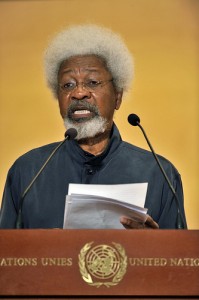In order to discuss Wole Soyinka’s speech (as reflected in the title), it is necessary to understand what Cultural Relativism implies. The first use of the term, “Cultural Relativism” was around 1924 when Alan Locke described Robert Lowe’s “extreme cultural relativism”, and since then there have been numerous debates between cultural relativism and universal human rights.
It is normal to assume that any intelligentsia from the so-called Third World will find the philosophy of cultural relativism abhorrent and definitely unacceptable. This is because it is the principle that an individual human’s beliefs and activities should be understood in terms of his or her own culture. Some schools of thought also believe it to be an undeniable fact; moral rules and social institutions evidence a surprising cultural and historical inconsistency.
However, there is a conflict with those who hold universal human rights very dear, and this is evident from the Wole Soyinka’s treatise. The Nobel Laureate made no attempt to reconcile the competing claims of cultural relativism and universal human rights, and indeed is wary of the claims made by the proponents and promoters of the former.
The eminent, Nobel Laureate Professor also outlined the issue of “Cultural Diversity” of the human, which is of course an undeniable and acknowledged fact. Human beings are diverse and hence we have for example, blacks and whites, Africans and Asians, and even amongst Africans, we have Nigerians and South Africans, and furthermore, within Nigeria, we have Yorubas, Igbos and others.
To acknowledge other people’s diversity is a good thing and this, as is increasingly evident to all, should ultimately bring about the peaceful co-existence of diverse cultures and people in the world. However, the danger, as Wole Soyinka pointed out, is in the usurpation of the cultural diversity by the proponents of cultural relativism, despite the fact that they are mutually exclusive philosophies.
This has then led to a distortion of the principles of universal human rights, even as imperfect as it is. And perhaps, it is because of this imperfection that cultural relativists have been able to exploit the weakness
Furthermore, the essay pointed out how the philosophy of cultural relativism could be distorted to endorse certain human differences which are inherent in this world, and then used to justify certain barbarisms which we have experienced since the beginning of time. But then, we know that all ideas, philosophies and religious creeds could be so distorted even by the most devoted of practitioners of these creeds. We know how the holy books - The Bible and The Koran have been distorted for largely personal reasons, or to justify hatred, killings among others. It is the same way that cultural relativism has been, and is still being warped today, and will probably continue for a very long time.
The essay again asserted that cultural relativism has created an environment in which diverse views or opinions on various cultural, or rather socio-cultural issues in the society are refused or totally ignored, such that dissent is not permitted. This has therefore led to dictatorship, discrimination and even state-sanctioned genocide. An example of the latter that comes to my mind is the “ethnic cleansing” that happened when the former Yugoslavia broke up.
Diversity of culture and human rights are better presented without the baggage of cultural relativism. All humans, as the essay/speech pointed out, have rights by virtue of their humanity and those rights cannot be conditioned by gender or national or ethnic origin. Also, we know that human rights as it exists universally are the highest moral rights, so no rights can be subordinated to another person (e.g. a husband) or an institution (e.g. the state). This is in diametric opposition to the philosophy of cultural relativism.
One could therefore see the antagonism of human rights proponents and supporters to the theories of cultural relativism.
Personally, I believe, and this is also reflected very visibly in the essay/speech, that cultural relativism, if we are not careful, is leaning more towards accepting the inequality of races as a natural phenomenon, and therefore promotes racism. The essay also presupposes that it is this doctrine that could have been responsible for ethnic and religious problems and occurrences we are having all over the world today, and whose proponents are vigorously trying to push down our throats, especially in the so-called Third World or developing countries and economies of the world.
I am definitely not a fan or follower of the ideals or philosophy of cultural relativism. However, with a little bit of research to get more knowledge about the topic, I have come to realise that it is possible that both sides of the debate on cultural relativism and universal human rights are manipulated to be made reciprocally exclusive and both sides make claims that are not only valid but reconcilable.
From the point of view of someone whose people are always on the receiving end of injustice, discrimination, inequality, etc, (in this case, Africans), Wole Soyinka is right to be wary of a doctrine which instead of promoting equality and dignity of all races (that is Human Rights),but seems to be doing the opposite while couching the deed in a way that seems acceptable to everybody, and in fact is being promoted in high places around the world.
However, the fact remains that Human Rights, as we have it defined today, are not universal, but predicated on Western moral values which might not necessarily be adaptable to, say, someone in Botswana or Thailand, and therefore should not be imposed as model on non-Western societies in disregard of those non-Western societies’ historical and economic progress and in disregard of their cultural differences and perceptions of what is right and wrong.
Universalism holds that more “primitive” cultures will eventually evolve to have the same system of law and rights as Western cultures. Cultural relativists hold an apposite, but similarly rigid viewpoint, that a traditional culture is not changeable.
This then reflected what I have pointed out above that universalism is modelled after only the Western viewpoint, disregarding other cultures and in fact denigrating other cultures as inferior. This is racism of the highest order.
As again pointed out in the speech by Wole Soyinka, cultural relativism has great problems and potential for abuse, however, I submit that universalism or universal human rights in its current state is not the ideal solution. As an example, does having a society with an African King with 12 chiefs as an advisory council makes such system less representative than the that in a liberal Western society?
The challenge to moralists and proponents of both concepts is to “marry” the two viewpoints or philosophies or ideologies to find an ideal solution or a common ground for the betterment of the society at large. We still need to take into consideration such issues as efficacy of international laws, international system of human rights, promotion and protection of human rights, and state compliance.
However, if cultural tradition or cultural relativism alone governs State observance of international standards, then widespread disrespect, abuse and violation of human rights would be given legitimacy, and these I think, is the crux of Prof. Wole Soyinka’s essay.
*Wole Soyinka, 2008. “The Avoidable Trap Of Cultural Relativism”. Speech on the occasion of the second edition of the Geneva Lecture Series, Geneva, 10 December 2008
—————————————————-
Get your news stories and articles published on the best platform. Email: [email protected] | [email protected]













Depending on the context,the concept of cultural relativism is progressive and dynamic in nature. Keep in mind, the fact that this concept also promotes the equality of all cultures rather than promoting the often prejudiced idea that a particular culture is superior to the other:a veritable excuse for such historical blunders such as the second world war as well as colonialism of the worst model(the type that subsisted in Africa and not in North America). Consequently, the concept of cultural relativism can be a useful tool in strengthening the functionality and unity of the world cultures because as they say ‘normal is what you are used to’.